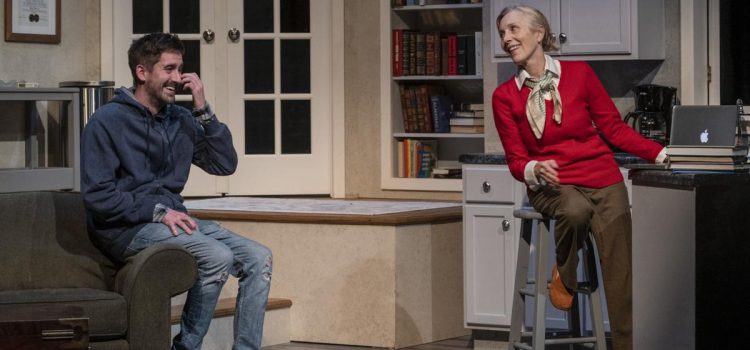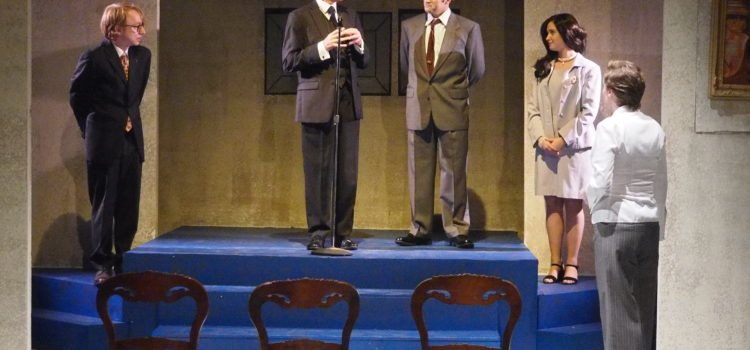By Lynn Venhaus
Jacqueline Kennedy once famously said: “If you bungle raising your children, I don’t think whatever else you do well matters very much.”
The cold-hearted Iris Banks (Kari Ely) apparently did not agree. She made a choice, to pursue a literary career first, leaving her husband and child. Now grown, her bitter and resentful son Cal (Spencer Sickmann) unexpectedly returns home, but he is not exactly welcomed like the Prodigal Son. And she is closer to “Mommy Dearest” than Mother Earth.
In an intense psychologically complex drama, “Comfort,” a fierce new work by renowned playwright Neil LaBute that is premiering at St. Louis Actors’ Studio (Dec. 3-19), two of our finest stage artists fearlessly tango.
There is much baggage to unpack as mother, now a literary titan – three Pulitzers! — and child, who is still finding his way, reveal their past and present relationship.
These fully dimensional roles are demanding and exhaustive, but brave Ely and Sickmann exhibit their stamina and superior skills at delivering such emotionally layered performances.
Awkward exchanges and pleasantries give way to an uneasy détente (short-lived), stunning disclosures (the hits just keep on coming) and blistering confrontations. They are two people on opposite sides of a great divide, a rift that has grown over time and still an open wound, for no healing was attempted.
At times, the icy Mom, who admitted she had no maternal instinct but attempted the wife-and-motherhood roles set forth in society, seems to thaw. And son appears to soften his hostility, but those are brief respites from some harsh exchanges as Iris declares she is all about the “truth,” but son reveals he has evidence to the contrary.
The two performers wear their characters’ bravado like a badge of honor – until they don’t. Mom is unapologetic about her distain for literary rivals or for ‘normal’ trappings of family life – but occasionally, her steely demeanor will crack, showing us an inkling of regret.
It’s such a masterful portrayal by Ely, who has tackled her share of uncommon, tough females – including Martha in “Who’s Afraid of Virginia Woolf?”, Violet in “August Osage County” and Regina in “The Little Foxes,” all on the Gaslight stage.
And a never-better Sickmann plays Cal like a wounded animal, cornered but ready to pounce. Since bursting on the local theater scene about five years ago, he has capably delved into guys with an edge but also showing vulnerability – Mitch in “A Streetcar Named Desire,” Hal in “Picnic,” press secretary Stephen in “Farragut North” and artist Matt in “The Feast,” among them.
LaBute’s rhythmic dialogue has bite, and the pair show their verbal dexterity in meaty exchanges. Do not underestimate their ruthlessness.
LaBute, a prolific playwright and screenwriter who has made waves since the early 1990s, often writes characters that are schemers or callous, calculating ones who use people for their own advantage. They may not be likable, but they are survivors – and they are fascinating
One of LaBute’s hallmarks is that he will divulge character flaws in such a chilling way as to take a jarring and dramatic turn that changes the temperature in the room. He’s all about the gray area, never specifically black-and-white – and that’s what makes his plays so compelling.
Director Annamaria Pileggi keeps the unsettling narrative moving at a brisk clip, and Patrick Huber’s impressive set design efficiently uses the space to move the action forward. Fine work by Huber as lighting designer, sound designer Robin Weatherall, costume designer Teresa Doggett and fight choreographer Shaun Sheley.
Even with a lengthy run time, you still want to hear what Iris and Cal have to say to each other – and you’ll still be caught off-guard.
STLAS has collaborated with LaBute since 2012, mainly as part of the LaBute New Theater Festival, in which international one-act entries are selected to be part of two line-ups. He is a co-producer and often an active participant.
The previously unproduced plays must be 45 minutes or less, and not have more than four characters. They must be able to be presented in The Gaslight Theatre’s intimate space.The selected works are usually marked by sharp writing and smart acting.
And LaBute writes an original work to premiere every summer, which is included in both slates. A few of them have been dark and disturbing or acerbic, or both.
One of the festival’s components that LaBute is most proud of is the High School Play Competition, encouraging teenage writers to pursue playwrighting. The winning plays are presented as readings.
But this is the first time that LaBute is premiering a new two-act play separate from the annual summer fest.
The fest will return the summer of 2022. In the meantime, theatergoers can marvel at the riveting work by Ely and Sickmann, who bob and weave like pro athletes.
The ironically titled play, “Comfort,” may still be a work in progress, but it provides a bracing vehicle in which to show a delicate balance in a mother-son dynamic.

“Comfort” is presented by the St. Louis Actors’ Studio at The Gaslight Theatre, 358 N. Boyle Avenue, St. Louis, Thursday through Saturday at 8 p.m. and Sunday at 3 p.m. Dec. 3-19. Tickets are available through Ticketmaster. For more information, call 314-458-2978 or visit www.stlas.org.
Proof of Vaccination Must Be Presented and a Mask Must Be Worn While in the Theater.

Lynn (Zipfel) Venhaus has had a continuous byline in St. Louis metro region publications since 1978. She writes features and news for Belleville News-Democrat and contributes to St. Louis magazine and other publications.
She is a Rotten Tomatoes-approved film critic, currently reviews films for Webster-Kirkwood Times and KTRS Radio, covers entertainment for PopLifeSTL.com and co-hosts podcast PopLifeSTL.com…Presents.
She is a member of Critics Choice Association, where she serves on the women’s and marketing committees; Alliance of Women Film Journalists; and on the board of the St. Louis Film Critics Association. She is a founding and board member of the St. Louis Theater Circle.
She is retired from teaching journalism/media as an adjunct college instructor.


